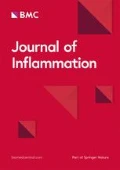Background
RNA viruses are major causes of respiratory infections and known to exacerbate asthma and other respiratory diseases. The objective of the study was to use poly I:C, a synthetic analogue dsRNA, to elicit exacerbation in a model of allergic inflammation driven by house dust mite (HDM) in Freund's Complete Adjuvant (FCA). This model is characterized by airway hyperresponsiveness (AHR) and a mixed T-helper phenotype [1].
Materials and methods
BALB/c mice were sensitised subcutaneously on day 0 with HDM (100µg) in FCA as previously described [1]. On day 14, mice were exposed to saline or HDM (25µg) via intranasal instillation (i.n.). Poly I:C (30 µg) was administered i.n. 24hrs before (-24hr), at the same time (0hrs) or after (+6hours,+24hours) HDM challenge. 24 hours post-challenge, non-invasive whole-body plethysmography was used to assess AHR stimulated by aerosolised methacholine (MCh, 0-16mg/ml). 48 hours after HDM challenge, the bronchoalveolar lavage fluid (BALF) was collected to measure inflammatory cells.
Results
Poly I:C exacerbated BALF neutrophils (-24, 0,+6), macrophages (-24, 0,+6) and lymphocytes (-24, 0) in the HDM challenged animals. At -24hrs or +6hrs, the AHR associated to MCh was also significantly exacerbated.
Conclusions
Poly I:C exacerbates the inflammation and AHR in a murine model that mimics certain aspects of persistent asthma. This model could be used to investigate new mechanisms of action underlying viral exacerbation in persistent asthma and for the assessment and evaluation of novel therapies for such condition.
References
Nasra J, Tomlinson K, Catley M, Palframan R, Watt G, Shaw S, Gozzard : Development Of a Murine Model Of Lung Inflammation And Airway Hyperresponsiveness Driven By House Dust Mite In Complete Freund’s Adjuvant. Am J Respir Crit Care Med. 2010, 181: A2842-
Acknowledgements
This model was developed in partnership with UCB on behalf of the U-BIOPRED BIOPRED Study Group with input from the U-BIOPRED Patient Input Platform, Ethics Board and Safety Management Board. The research leading to these results has received support from the Innovative Medicines Initiative Joint Undertaking under grant agreement no. 115010, resources of which are composed of financial contribution from the European Union’s Seventh Framework Programme (FP7/2007-2013) and EFPIA companies’ in kind contribution.
Author information
Authors and Affiliations
Corresponding author
Rights and permissions
This article is published under license to BioMed Central Ltd. This is an Open Access article distributed under the terms of the Creative Commons Attribution License (http://creativecommons.org/licenses/by/2.0), which permits unrestricted use, distribution, and reproduction in any medium, provided the original work is properly cited.
About this article
Cite this article
De Alba, J., Otal, R., Calama, E. et al. Poly I:C causes exacerbation in a murine allergic inflammation model driven by house dust mite in Freund's complete adjuvant. J Inflamm 10 (Suppl 1), P21 (2013). https://doi.org/10.1186/1476-9255-10-S1-P21
Published:
DOI: https://doi.org/10.1186/1476-9255-10-S1-P21

